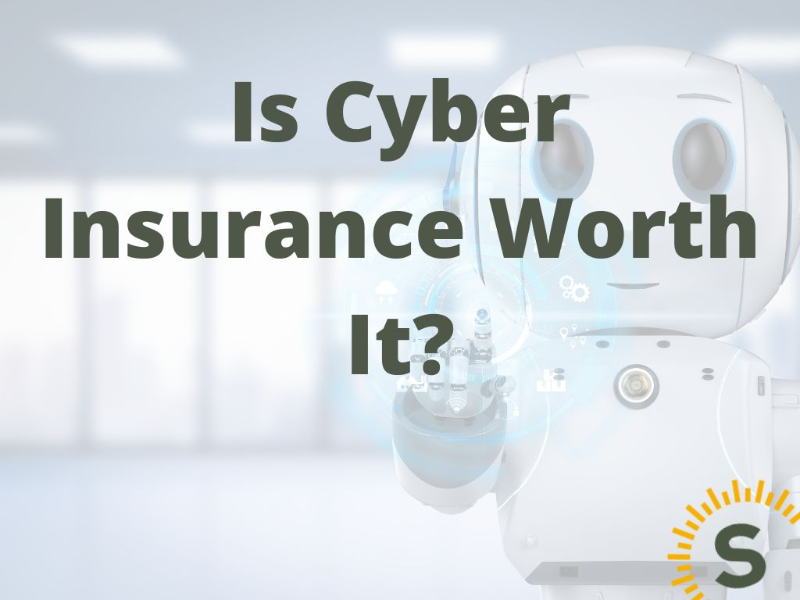
Cyber insurance covers companies or individuals against the financial losses and damages caused by cyber-attacks, data breaches, and other types of online security breaches, but is cyber insurance worth it?
Cyber insurance can help to cover the costs associated with recovering from a cyber attack, including legal fees, loss of income, and damage to reputation. It can also provide liability coverage for businesses if they are liable for failing to protect customer data.
In this insight, we are going to cover why cyber insurance is important whether you need it for your business.
Cyber insurance may be worthwhile if a person or business has sensitive and valuable data that could be targeted by a cyberattack in order to guard against possible financial damages and losses.
Additionally, cyber insurance can aid in covering any potential fines or penalties if a person or corporation is forced to follow particular rules or laws related to data protection.
However, cyber insurance may not be required if a person or firm has little to no sensitive data or is exempt from any regulatory requirements.
According to the UK National Cyber Security Centre (NCSC), over 4,000 businesses and organisations were impacted by cyber attacks in 2022. All businesses that store or process sensitive data, including personal information of customers or employees, and financial information, should consider purchasing cyber insurance.
This includes businesses in the financial, healthcare, retail, and technology industries, as well as small and medium-sized businesses.
Additionally, businesses that rely heavily on technology and the Internet for their operations may also benefit from cyber insurance.
Since there may be several parties participating in a cyber breach, it is challenging to pinpoint who is to blame. The attack was carried out by the hackers that carried out the breach. But failing to sufficiently protect their systems and data will also be the responsibility of the targeted business or person.
In the end, a thorough investigation and legal assessment may be necessary to establish liability in a cyber breach.
Data breaches, malware attacks, ransomware assaults, and business delays as a result of cyberattacks are the most often reported claims for cyberinsurance.
A data breach is a situation in which an unauthorised person or group gains access to or steals sensitive or personal information.
Personal data like names, addresses, National Insurance Numbers, financial data, or confidential business information can fall under this category. For both individuals and organisations, data breaches can have detrimental effects that include financial losses, reputational harm, and a loss of customer trust.
In a malware attack, harmful software, commonly referred to as malware, is purposefully placed on a victim's computer or device without that victim's knowledge or agreement. A malware assault often aims to impair the device or network's regular operation or obtain unauthorised access to sensitive data.
Malware can spread through a number of channels, including email attachments, compromised websites, and network weaknesses. It can manifest as viruses, worms, Trojan horses, ransomware, and spyware.
In a ransomware attack, the victim's data is encrypted and the attacker requests money (often in the form of cryptocurrency) in return for the decryption key. Until the ransom is paid, the victim cannot access their data.
Attacks with ransomware can have a severe negative impact on a person's or organisation's finances and reputation.
Cyber insurance typically covers a range of potential losses and liabilities resulting from cyber incidents, including:
Several variables, including the size and kind of the organisation, the desired level of coverage, and the perceived amount of risk, might affect the price of cyber insurance in the UK.
However, businesses should anticipate spending between £500 and £1,500 annually for complete cyber insurance coverage. However, it can be as little as £15 a month.
The ICO (Information Commissioner's Office) is the UK's independent body responsible for upholding information rights and protecting personal data. To protect individuals against cyber attacks, the ICO:
Overall, the ICO aims to promote best practices and hold organisations accountable for protecting personal data, thus providing individuals with greater protection against cyber attacks.
Cyber insurance policies are bespoke to your business needs. The level of cover you need depends on your IT infrastructure. The factors to consider can make it difficult to accurately cover your business when selecting a policy, especially if you aren't sure of what is needed.
But, is cyber insurance worth it? It is certainly a good idea to talk through your business requirements with an Insurance adviser to help you determine your cyber risk. To get started with a no-obligation chat with an insurance adviser who specialises in Cyber insurance, complete the Sunny Fact Find for Business protection & Insurance.

Stuart is an expert in Property, Money, Banking & Finance, having worked in retail and investment banking for 10+ years before founding Sunny Avenue. Stuart has spent his career studying finance. He holds qualifications in financial studies, mortgage advice & practice, banking operations, dealing & financial markets, derivatives, securities & investments.
 No minimum
No minimum  Free Consultations
Free Consultations
 No minimum
No minimum  No obligation consultation
No obligation consultation
 No minimum
No minimum  No obligation consultation
No obligation consultation
 No minimum
No minimum  No obligation consultation
No obligation consultation
 No minimum
No minimum  No obligation consultation
No obligation consultation
 £51,000+
£51,000+  Free Consultations
Free Consultations
 No minimum
No minimum  Initial or Ongoing Consultation Fees
Initial or Ongoing Consultation Fees
 No minimum
No minimum  No obligation consultation
No obligation consultation
 No minimum
No minimum  Initial fee free consultation
Initial fee free consultation
 No minimum
No minimum  No obligation consultation
No obligation consultation
 No minimum
No minimum  Initial fee free consultation
Initial fee free consultation
 £101,000+
£101,000+  Bishop's Stortford, Hertfordshire
Bishop's Stortford, Hertfordshire No obligation consultation
No obligation consultation
 No minimum
No minimum  Initial fee free consultation
Initial fee free consultation
 No minimum
No minimum  Free Consultations
Free Consultations
 £51,000+
£51,000+  Sheffield, South Yorkshire
Sheffield, South Yorkshire No obligation consultation
No obligation consultation
 No minimum
No minimum  Free Consultations
Free Consultations
 No minimum
No minimum  Free Consultations
Free Consultations
 No minimum
No minimum  Free Consultations
Free Consultations
 No minimum
No minimum  Free Consultations
Free Consultations
 No minimum
No minimum  Coatbridge, Lanarkshire
Coatbridge, Lanarkshire Initial or Ongoing Consultation Fees
Initial or Ongoing Consultation Fees
 £21,000 +
£21,000 +  Initial fee free consultation
Initial fee free consultation
 London, Greater London
London, Greater London No obligation consultation
No obligation consultation
 No minimum
No minimum  Initial or Ongoing Consultation Fees
Initial or Ongoing Consultation Fees
 No minimum
No minimum  No obligation consultation
No obligation consultation
 No minimum
No minimum  Initial fee free consultation
Initial fee free consultation





Our website offers information about financial products such as investing, savings, equity release, mortgages, and insurance. None of the information on Sunny Avenue constitutes personal advice. Sunny Avenue does not offer any of these services directly and we only act as a directory service to connect you to the experts. If you require further information to proceed you will need to request advice, for example from the financial advisers listed. If you decide to invest, read the important investment notes provided first, decide how to proceed on your own basis, and remember that investments can go up and down in value, so you could get back less than you put in.
Think carefully before securing debts against your home. A mortgage is a loan secured on your home, which you could lose if you do not keep up your mortgage payments. Check that any mortgage will meet your needs if you want to move or sell your home or you want your family to inherit it. If you are in any doubt, seek independent advice.